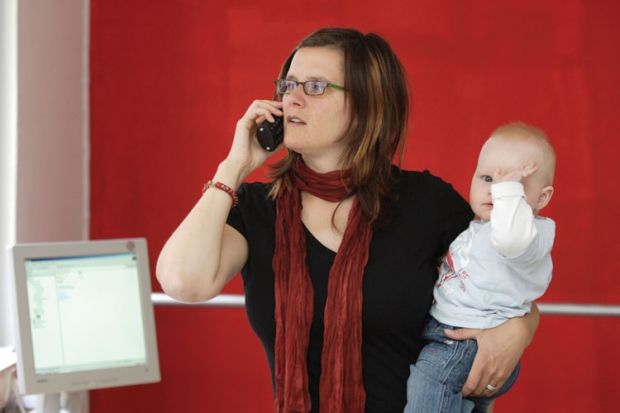Source: Alamy
Other battles: the burden of childcare falls mainly to women, which can restrict their ability to take on leadership positions
Women are not applying for top positions at universities because they do not want to be dragged into “gladiatorial” leadership battles, an international conference has heard.
Speaking at a colloquium organised by the International Federation of University Women under its International Colloquia Project, Euginia Member George-Genyi, a lecturer in political sciences at Benue State University, in Makurdi, Nigeria, said that many female academics did not seek leadership posts because they were intimidated by the “combative and often violent” nature of running for top office.
Others were put off by deep-rooted cultural beliefs that women who pursued leadership roles were unfeminine, Dr George-Genyi told an audience of female academics at her own university.
“The danger of being labelled as wayward, too outspoken and ‘too liberated’ makes most women keep a respectable distance from university politics and leadership contests, even when they are capable of providing good leadership,” she said.
Her reflections form part of a report, Breaking Down Barriers to Female Leadership in Higher Education, published last week, which details discussions in 13 countries on the issue.
The first event took place at the University of London in May 2011. That paved the way for conferences in countries including Australia, Bolivia, El Salvador, India, Nepal, Norway and Sweden.
At the conference in Makurdi, which took place in July 2012, Dr George-Genyi said that negative perceptions of women had “permeated the age-old university tradition of objectivity and passion for values”, leading to a lack of women in senior positions.
“This is clearly manifested at elections to deaneries, departments, directorates and the vice-chancellorship; university administration is considered the prerogative of men,” she said.
Other forums heard how negative perceptions of women’s capabilities were stopping them reaching the top.
Nati Maiya Manandhar, head of Tribhuvan University’s campus in Gulmi, Nepal, told her country’s colloquium that female leaders were rare because married women were viewed as unable to hold decision-making positions.
Women also had to shoulder the burden of raising children and looking after elderly family members, which restricts their ability to play a full role in university affairs, Dr Manandhar told the conference.
‘Long on hair; short on brains’
In Slovenia, Maca Jogan, professor emeritus of sociology, University of Ljubljana, told an audience that the stereotype of “long on hair; short on brains” still persisted.
However, positive discrimination policies, such as legally imposed quotas of female executives, were beginning to yield results, with more women holding senior positions.
Some areas of study were still resistant to female leaders, said Lučka Kajfež Bogataj, head of Ljubljana’s Biotechnical Faculty.
In the natural sciences, there remains a deep-rooted belief that women are incapable of fulfilling leadership tasks, she said.
Vincent Biruta, Rwanda’s minister of education, told a colloquium at the Institute of Education in Kigali that gender discrimination had to be tackled to increase the number of senior women in academia.
However, “many women shoulder the bulk of teaching, marking tutorials, preparing courses and exams, and teaching in the universities”, Dr Biruta said.
“Women are systematically finding themselves channelled into secretarial and administrative work and teaching, not having enough time left to do the research work that leads to career advancement.”
Losing successful female scholars to better-paid public service and private sector positions, as well as to international and national non-governmental organisations, had hindered plans to have at least 30 per cent of decision-making posts filled by women, he added.
“The consequent serious lack of female role models and the scarcity of women with higher degrees in the universities weaken the confidence of younger women,” Dr Biruta said.
Thankless work
Meanwhile, Amanda Gouws, professor of political science and gender studies at the University of Stellenbosch in South Africa, told an audience at the University of Cape Town that women must risk becoming unpopular in campaigning for their rights.
She helped lead a 10-year effort to get her university to introduce a policy to prevent sexual harassment, and she has also been calling for subsidised childcare and the inclusion of women on academic appointment committees. For all this work, she has received little or no thanks, she said.
Professor Gouws said there was a high attrition rate of women who become heads of institutions, citing high workloads as a problem.
“The glass ceiling is not so impenetrable, but there are other factors that are a problem,” she said.




